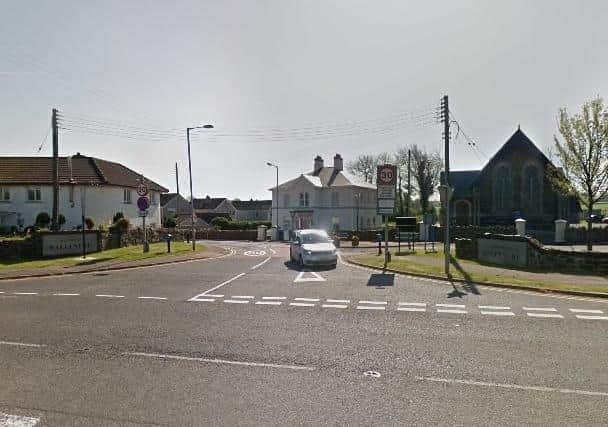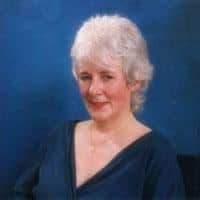Ballynure-linked folklorist seeking wartime stories for new book
and live on Freeview channel 276
Doreen, a retired teacher who is now a full-time author and storyteller, has featured at storytelling festivals in the United States, New Zealand, Scotland and England as well as across the Emerald Isle.
She has also published 20 books on folklore and tradition, and is now researching a volume on memories of the Second World War for a well-known UK publisher.
Advertisement
Hide AdAdvertisement
Hide Ad“I am interested in stories about the wartime period and also leading up to the war,” she said.


“A wide range of stories and memories are welcome, and this is a platform for people’s memories, and not an academic book.”
With a deadline of October to have her manuscript complete, Doreen is interested in hearing from people in the area who have interesting stories to tell.
The author says she has some fond memories of visiting relatives in Ballynure and surrounding area during the war years.
Advertisement
Hide AdAdvertisement
Hide Ad“I was three years of age, when, during the Second World War I was taken by my mother, Anne Henry (neé Finlay) to visit her aunts Bella, Lizzie and Aggie Finlay. They lived at Skilganaban near Ballynure,” she has detailed in a story of her own to get the process underway.


Doreen adds: “Bella, Aggie and Lizzie were kindly. They made us very welcome and said they were making Irish stew for lunch. Mum said she couldn’t wait to get ‘stuck into it’. She remembered enjoying it as a child when she’d spent her school holidays with them. In the past the air in Belfast was much polluted so Granda Finlay’s siblings looked after his children during school holidays to give them some healthy, clean country fresh air,
“Mum used to tell me stories about working in the fields, following their five cows to the byre at milking time, the beautiful smell of meadow sweet and honeysuckle, the garden she used to play in. She was bathed on Saturday nights in a large tin bath in front of the fire, then taken upstairs before and tucked up in a cosy bed covered by patchwork quilts made out of old tweed coats.
“She said the smell of lavender on linen sheets always reminded her of her aunts. I found the most impressive story of all was about the companionship found when using the seven-seater toilet in the byre. Mum said, ‘About five o’clock somebody would say, ‘Does anyone feel like going to clock?’ and a group would go into the byre, occupy the seats, and have ‘lovely wee conversations’ while doing their business. In those far-off days proper sewage facilities were rare and people cut squares of newspaper to use instead of toilet paper,” Doreen recalls.
Advertisement
Hide AdAdvertisement
Hide Ad“The sisters cooked using an old-fashioned crook and crane with a black iron pot suspended from it. Delicious smells wafted round the room and their soda bread and scones were so light they melted in the mouth. I liked the kitchen. It was comfortable and homely, but I didn’t like what happened next! A ‘thing’ walked out of the bottom of the wall.
“Aunt Lizzie said, ‘Oh! The wee dear! Wait until you see this Doreen!’ She dusted some flour on the hearth and a whole lot of the ‘things’ came out from under the wall and started making funny noises. Aunt Liz said, ‘Crickets, they bring luck. The wee dears! Aren’t they lovely?’”
Doreen also recalled that an elderly man came in, wearing an old duncher and smoking a pipe. He was made very welcome and settled down in a grandfather chair at the side of the fire with a cup of tea and one of those delicious scones.
The aunts and Doreen’s mother said, ‘Go’n Andy, gie us a song!’ At first Andy refused, then Mrs. Henry said, ‘I’d love to hear an “Auld Cum All Ye”. I haven’t heard one for years.’ Andy smiled and began, ‘Cum all ye fine people, and listen til my song, it’s only forty verses and t’will not keep ye long,’ Doreen remembers that everyone except her were in kinks of laughter, but that she couldn’t understand a word!
Advertisement
Hide AdAdvertisement
Hide Ad“On the way home in the bus I asked Mum why I couldn’t understand and she said that was because they were using the ‘old language.’ I asked why everyone was laughing. She said the song was ‘rude’. She was reluctant to tell me, but eventually did. It was about a local Presbyterian church hall that had dances on Saturday nights. Like most halls it didn’t have what we would regard as proper toilet facilities. There was a room upstairs to which the girls retired at the interval for a comfort break. It had a row of potties along one wall for their use. The boys, who, set up the room, decided to play a joke and placed some baking soda in each of the potties and when the girls did their business they got a shock when froth came up round them.”
Doreen said that years later she had the privilege of getting to know local historian, the late Ernie Scott and his wife Marjorie. When she recounted the memory to him, Ernie laughed. He recounted that the man who sang was called Andy McMinn. The church hall was Straid Presbyterian Church and Ernie admitted that he was one of the “big ligs” who put the baking soda in the goes-unders (the name given to potties, as they usually went under the bed).
Doreen says she still have “a very soft spot in my heart for the area around Ballynure and the happy memories all those people who are long gone”.
Anyone who would like to get in touch with Doreen re stories for the book can contact her at [email protected] or phone 07767478051.
---
Advertisement
Hide AdAdvertisement
Hide AdClick here to read: Warm praise for new thriller by Larne’s ‘nautical novelist’
--
Thank you for reading this article. We’re more reliant on your support than ever as the shift in consumer habits brought about by coronavirus impacts our advertisers. Please consider purchasing a copy of the paper. You can also support trusted, fact-checked journalism by taking out a digital subscription of the News Letter.